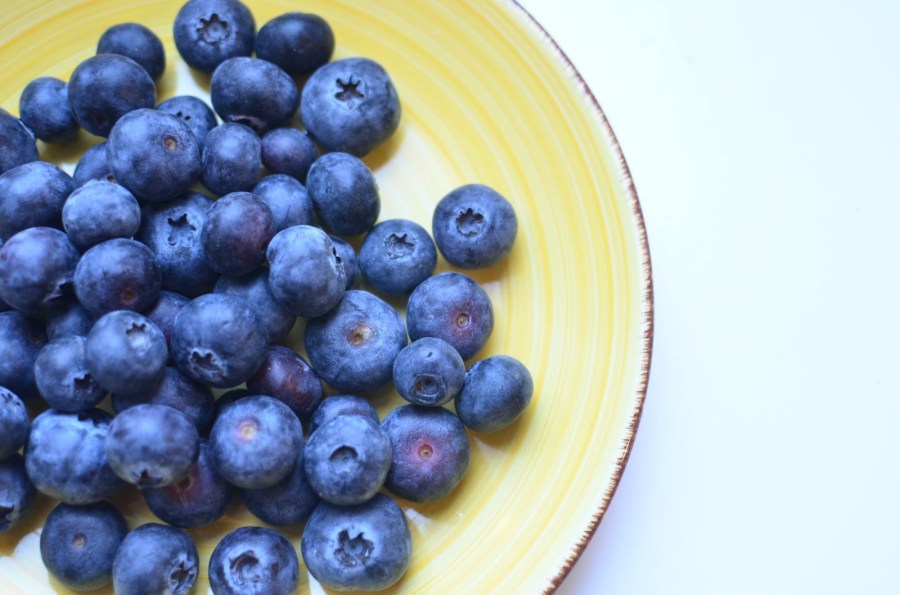What to Feed a Dog When He is Refusing to Eat
Blueberries are one of the most popular fruits on the market and with good reason! Not only is this superfood flavorful and the perfect addition to almost any meal, but they are also packed with potential health benefits—at least for humans. But what about your canine companion? Will a blueberry harm them? If you've ever found yourself concerned about the potential outcome of your pup snatching a blueberry, you're in the right place.
With dogs, it's important to know what's safe to ingest and what isn't. Even a small, simple error could have horrifying consequences. That's why it's your job as a responsible dog owner to ensure that your pet isn't getting their hands—err, paws—on anything they're not supposed to eat. We all know that chocolate, garlic, and onions are no good for dogs, but what are the instructions for blueberries?
Today, we're going to share some information with you about dogs and blueberries, namely if they're safe to eat and if there are any health benefits associated with your pooch eating them. We'll start by answering your basic questions and then go more in-depth. Get excited because there is a lot to learn on this topic. Read on, and you will soon be able to consider yourself an expert on this subject!
Are Blueberries Safe For My Dog?
Photo Courtesy: [Skyler Kang/Unsplash]
We'll cut right to the chase: yes, blueberries are absolutely safe for your dog to eat. That being said, you should be cautious to ensure your dog doesn't choke on these fruits, as they are small and round. It's a good idea to be nearby when your dog is eating their blueberries in case you fear they're choking or need medical assistance. If your dog doesn't love blueberries, you can try blackberries, cranberries, or peaches (but never let them eat the pit).
What Are The Health Benefits Associated With Feeding My Dog Blueberries?

We are glad you asked! There are actually a bunch of health benefits associated with feeding your canine companion blueberries, and we're here to share those with you. Of course, there certainly is too much of a good thing: these fruits are treats, so we need to treat them as such. Nevertheless, if you feed your dog the appropriate amount, you will find these berries have a myriad of benefits.
Not only are blueberries low in calories, but they are also known for the high levels of vitamin C they contain. That's not all, however. Blueberries also feature fiber and phytochemicals, which are chemical compounds found in plants and occur naturally.
The main reason why blueberries are healthy for your canine is due to the presence of vitamin C, vitamin k, and fiber; both are vital to proper canine nutrition. In addition to this, the phytochemicals are also connected to several facets of health, including your dog's immune system. Blueberries also pack the powers of minerals like calcium, magnesium, and phosphorus.
If that isn't enough, it is also important to know that blueberries are packed with valuable antioxidants. These are valuable as they can fight free radicals, which can create cellular or molecular damage in both humans and dogs.
There's another reason why antioxidants should certainly be included in your dog's diet: they are known for reducing the impact of brain aging. If your dog is a senior or getting older, this could prove helpful.
Overall, blueberries are an excellent addition for your pet–and just as they have been shown to improve the health of human beings, the same goes for animals such as dogs.
How To Feed Your Dog Blueberries

There are a variety of ways that you can feed your pup blueberries. Whether you prefer to feed them frozen or fresh, your dog will get all of the same benefits. Therefore, whatever your dog prefers and you have on hand will work.
Of course, you should be mindful to feed your dog blueberries in moderation. After all, they are a treat, not part of your dog's regular diet. Because blueberries are small, you won't need to cut them up for your pet.
That being said, if you have a smaller dog, you might choose to. Blueberries are tiny and round and therefore pose a choking hazard. You can essentially eliminate this risk by chopping your blueberries in half before you administer them to your pooch.
As we mentioned, blueberries are a treat. Treats should never make up over 10 percent of your dog's regular, daily diet. And of course, as you would with all other fruits and vegetables, you should give those blueberries a nice, thorough risk before you put them on your dog's plate. Sometimes fruits and veggies contain pesticides and dirt; washing can help remove those.
While blueberries are safe for dogs, avoid blueberry muffins and blueberry yogurt that are made for humans.
If it's possible, you should always go for organic, sustainably raised blueberries. This will eliminate the chance the product has either pesticides or herbicides on it. In addition, if the blueberries are in your fridge, you should watch out for mold if it's been a while since you fed them. Carefully inspect any berries before you give them to your pet.
Of course, you can always reach out to a trusted vet if you have any reservations about the proper way to feed blueberries to your dog. Additionally, you should always monitor your dog closely after giving them a new food for the first time–including blueberries.
We also think it's important to follow the golden rule of feeding your pet and introduce new products slowly. Try to give your pet two or three and keep an eye out for negative reactions. These could include loose stools, vomiting, itching, or stomach distress. If your dog appears to be alright, you can try to give two to three berries several times a day. Work your way up; you can eventually give them ten to 12 berries or a handful a day. Starting slow is always better!
Why Does My Dog Have To Eat Blueberries In Moderation?

So if blueberries are so good for dogs, why do you have to feed them in moderation? If this question has crossed your mind, we are happy to inform you that we have an answer for you.
The reason that dogs have to eat blueberries in moderation is because this fruit is high in fiber. If your dog eats too many of these too quickly, this could lead to stomach distress or even diarrhea (which we're certain neither you nor your pet want to deal with).
These berries are also sugary and can cause cavities for your dog. You also always want to be considerate about how much sugar you are giving your pet. Lastly, if you want to make blueberry-flavored treats, be sure that you are using real blueberry flavor. Anything artificial is no good for your pet. These can contain toxic chemicals. As always, if you have any individual questions, you can always refer to a trusted veterinarian.
What Are Some Blueberry Recipes For Dogs?

Yes, you heard that right: it's perfectly possible to use blueberries in recipes you can craft for your canine companion! Let's run through some ways that you might want to incorporate blueberries into recipes.
You might notice that your dog prefers blueberries one texture over the other. Some dogs like frozen berries better, others like soft, squishier ones. Once you find what your pet prefers, you can roll with that.
You can offer your dog some frozen berries on days when it's warm, and your pup can use a chilly treat. You might also consider drying blueberries; these make a chewy, sweet snack that your pet is sure to adore.
You can also mash up some blueberries and add them to your dog's regular kibble for a bit of flavor. This not only will brighten up your dog's dish, but it will also allow your pup to reap all the benefits of adding blueberries into their diet. Alternatively, you can sprinkle whole blueberries on top of their kibble—whatever works. Many brands of dog food include some blueberries in their mixture.
Does your dog have a Kong? You can also even add some dried berries into your Kong along with dog-safe peanut butter. This will keep your dog entertained for hours; trust us. You can also freeze some blueberries in ice cube trays to add a splash of flavor to their water.
If you want to try your hand at baking for your pet, you can also certainly do that. If your dog's diet already features grain, consider baking them a grain-free treat that includes blueberries. It's relatively simple and only requires a few ingredients. It will also allow you to harness the benefits of blueberries into a format that your dog is sure to love snacking on.
A Delicious, Low-Calorie Treat

If you follow these guidelines for feeding your dog blueberries, we know that you will find yourself successful. Of course, if your particular pooch doesn't like these berries, don't force them to! Maybe they like veggies more! Try carrots or small amounts of broccoli. (Stay away from veggies like the avocado and mushrooms (wild and farm-grown).
All dogs have different preferences, and there are plenty of other types of fruit you can give your dog as a nice treat. We hope that you now have answers to all of your blueberry and dog-related questions. Good luck, and happy blueberry feeding!
SOURCES:
Can Dogs Eat Blueberries? Are Blueberries Good For Dogs? | AKC
Dogs and Blueberries: The Good, Bad and the Berry | Darwin's Pet
Can Dogs Eat Blueberries? | Purina
Source: https://www.reference.com/pets-animals/can-dogs-eat-blueberries?utm_content=params%3Ao%3D740005%26ad%3DdirN%26qo%3DserpIndex&ueid=3a36a29c-4ec7-4834-b1f3-3602c4a685eb
0 Response to "What to Feed a Dog When He is Refusing to Eat"
Post a Comment